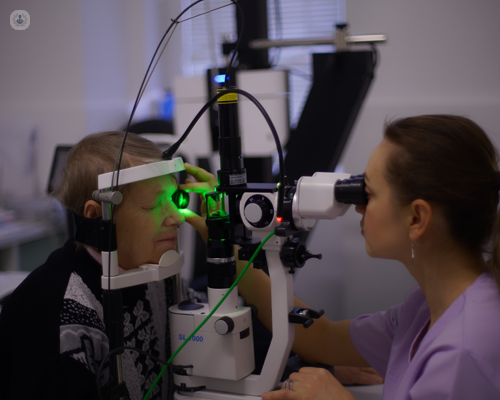How surgery to remove cataracts is performed and whether they can return afterwards
Written by:Cataracts are when your natural lens, that are normally clear, becomes cloudy. Much like greying hair, cataracts are a normal part of aging. Although common, if left untreated cataracts can greatly impact one’s quality of life. Southampton-based leading consultant ophthalmologist Miss Stephanie West shares her expertise on how the condition is treated surgically.

How do cataracts develop?
The lens of the eye is made up of proteins called crystallin. You are born with these proteins but as you get older, these proteins denature, which causes cataracts. As a result, the vision can become cloudy with time. It can present in various ways; for example, it can change your glass prescription, make you short-sighted, cause visual discolouration as the proteins discolour, or cause glare around lights making it difficult to drive at night. Cataracts are part of a natural aging process and everyone develops cataracts to a certain degree. They only become a problem if your vision is compromised as a result.
When is surgery indicated for cataracts? Can surgery be performed after laser procedures like LASIK?
When cataracts cause problematic visual symptoms, surgery is necessary. These symptoms include blurring, not being able to distinguish contrast, struggling to drive at night, or even the inability to carry out activities you want to do. If glasses can’t correct your vision, that’s when surgery should be performed. Very occasionally, surgery may be recommended for other reasons, for example, if they are affecting the pressure inside the eye, your ophthalmologist may opt to remove cataracts.
If you have undergone laser procedures before, such as LASIK, you are still suitable for cataract surgery. However, we will take this into account when calculating the correct lens we put in the eye for you, so it is important to provide your ophthalmologist with as much information as possible, including what your previous prescription was before laser surgery.
How is cataract surgery carried out? What are the risks involved?
Most patients are awake during cataract surgery and eye drops are used to numb the eyes. The surgery is performed under a microscope and done through microincisions in the capsule (a layer of membrane) of the lens, where the cataracts are. Ultrasound is used to break the cataract up and remove it. A new lens is then implanted using the patient’s own capsule as support.
Although cataract surgery is a relatively safe procedure, like everything, it's not without risk. That being said, the risks are minimal. There is a one percent chance of your vision worsening after surgery. Infection can occur inside the eye, but we try to prevent this with antibiotics at the end of the surgery. Bleeding inside the eye and retinal detachment can, although rare, cause significant problems afterward. There's approximately a two percent chance of needing another procedure, if not all the cataract is removed or the lens needs to be replaced.
Are both eyes operated on at the same time?
Most surgeons, like myself, only operate on one eye at a time to minimise the risks of complications, such as infections. It also means that we can assess the result of the lens implant and when it comes time to operate on the other eye, we can make the necessary changes. Some places do perform cataract surgery on both eyes simultaneously but it is not the standard at the moment in the UK.
What is vision like after surgery? When will clear vision return?
Clear vision returns relatively quickly after cataract surgery. Immediately after the procedure, your pupil is still dilated, and you might experience a slight blurring of vision of the eye. Additionally, you may feel a bit more light-sensitive than normal. Usually by the next day, your pupil would be back to the normal size and you should notice an improvement in your vision. Within the next few days, the discomfort should settle quickly. Using eyedrops with anti-inflammatory and antibiotic properties will help to continue to settle the vision.
How effective is cataract surgery? Are the results long-lasting?
Cataract surgery is extremely effective. Once the cataract has been removed and a new lens has been implanted, your vision should be significantly better than it was prior to surgery. You may still need glasses for the very best vision or to be able to read clearly. Once the cataract has been removed, it won't regrow.
It is possible, however, for the capsule that we leave behind to support the new lens to become cloudy. Patients may fear that their cataract has come back, but it hasn't. The clouding of the capsule can be treated very simply, as an outpatient procedure, with painless laser treatment, creating a little hole in the capsule and making the vision clear again.
Miss Stephanie West is a renowned consultant ophthalmologist, who sees patients in Southampton. If you would like to find out more about cataracts treatments, book a consultation with her via her Top Doctors profile.


